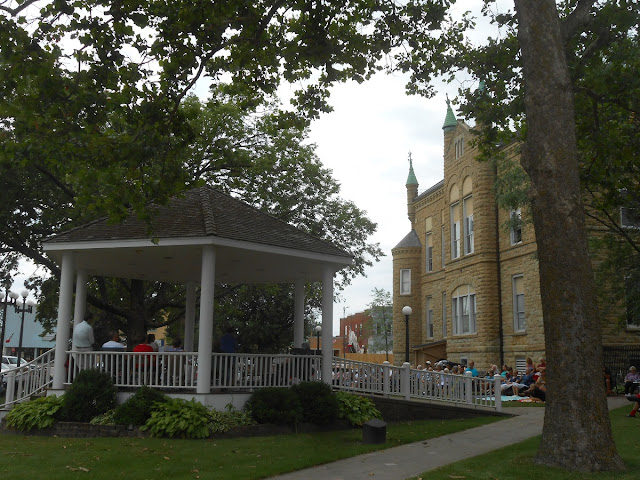The call to worship at Sunday morning's quintessentially small-town-Iowa Interchurch Council ecumenical service on the square was so lovely that it bears repeating:
Leader: Independence Day is this week.
People: We celebrate a time when our country declared its independence from foreign domination.
Leader: But many things dominate our hearts: fear, apathy, intolerance, anger.
People: May God hear our celebrations and also our cries for help.
Leader: Remember how God has blessed you, and be a blessing to others.
And the music was outstanding, too, thanks in large part to Tony Irving as song leader and soloist and to Nancy Courter, keyboard.
On the other hand, it would be disingenuous to report spiritual uplift --- especially since I did a little complaining yesterday --- although I'm sure many did experience just that.
But the cause for personal crankiness was largely my own fault --- I know what to expect at these gatherings and still choose to attend some years. Maybe this time I've learned my lesson. Then again, maybe not.
Small-town ecumenism can be a challenge for those of us whose "lifestyle" is not the norm or whose religion is not conservative protestant Christian.
I take exception, for example, to celebrations of American and protestant Christian exceptionalism in a setting that implies all will be made to feel welcome. And to such nonsense as suggestions that barring mandatory prayer and Bible reading in public schools is among the reasons for our current national predicaments.
On the other hand, those of us who are LGBTQ were not denounced specifically from the pulpit Sunday, although I've been there to hear such denunciations in the past. So I was grateful that "lifestyle" references were more general this year.
And I did enjoy Tony's first solo of the day, "This Is My Song," a celebration of those things that unite rather than divide us.
The words are by Lloyd Stone, an American school teacher, supplemented by an additional stanza or two by Methodist theologian Georgia Harkness. And the setting is taken from Jean Sibelius's patriotic symphonic poem, Finlandia. The latter was composed during a time of turmoil in Sibelius's native Finland, 1899-1900; and the later words, during a time of world-wide turmoil during the 1930s between World Wars I and II.
Here's another version of it, with another U.S. of American favorite, America, intertwined at the end with Stone's original words.






1 comment:
I love your writing ❤️ Thank you for sharing your experience
Post a Comment